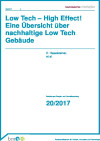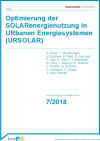Suchergebnisse für "Factsheet: Energietechnologien gestalten, die für alle sinnvoll und nutzbar sind"
Low Tech – High Effect! Eine Übersicht über nachhaltige Low Tech Gebäude

In dieser Studie wurden Ansätze von Low Tech Gebäuden näher betrachtet und besonders innovativ und repräsentativ erscheinende Konzepte detailliert dokumentiert. Ziel war es, den derzeitigen Stand der Technik und das vorhandene Know-how und Wissen anhand realisierter Beispiele aufzuarbeiten sowie Potenziale zur Weiterentwicklung aufzuzeigen.
Schriftenreihe
20/2017
Edeltraud Haselsteiner, Andrea Bodvay, Susanne Gosztonyi, Anita Preisler, Michael Berger, Bernhard Gasser
Herausgeber: BMVIT
Deutsch, 192 Seiten
Downloads zur Publikation
MADOKLI - Mannersdorf climate fit! Using local resources to combat and adapt to climate change for a climate-neutral neighbourhood
Development of a climate-neutral neighbourhood by integrating previously unused heat sources and sinks, such as the underground Mühlbach stream, to supply municipal buildings, to establish use-oriented water management and to develop solutions for climate-friendly outdoor spaces in the centre of Mannersdorf am Leithagebirge.
Optimierung der SOLARenergienutzung in URbanen Energiesystemen (URSOLAR)

URSOLAR stellt EntscheidungsträgerInnen eine Roadmap zur integrierten urbanen Solarenergie-nutzung zur Verfügung. Es wird aufgezeigt, wie Photovoltaik (PV) und Solarthermie angepasst an infrastrukturelle und rechtliche Gegebenheiten in idealtypischen Stadtquartieren aus ökonomischer, ökologischer und sozialer Sicht sowie unter Berücksichtig von Stakeholder-Interessen optimal ge-nutzt werden können.
Schriftenreihe
7/2018
A. Posch, T. Brudermann, M. Buchner, E. Fleiß, D. Geringer, P. Hart, S. Hatzl, T. Kallsperger, G. Lang, T. Mayrold, E. Meißner, C. Reischl, G. Schnedl, S. Seebauer, K. Stöger, A. Würz-Stalder
Herausgeber: BMVIT
Deutsch, 137 Seiten
Downloads zur Publikation
Sanierung PRO!

Entwicklung eines anwendungsorientierten Verfahrensmodells zur bestmöglichen Integration der Interessen der BewohnerInnen, der Interessen des Bauträgers sowie der Zielsetzungen der Wohnbauförderung
Passivhaus-Kindergarten mit Heilpädagogischer Integrationskindergruppe
Öffentliches Gebäude in Passivhaus-Technik unter Verwendung von lokal verfügbaren Baustoffen mit der Vorgabe eines streng limitierten Kostenrahmens.
LehB:KlimafitDemo2+1 - Living in existing buildings today: climate-friendly renovations in existing buildings within the framework of the common good housing law
The LehB:KlimafitDemo2+1 project examines innovative renovation solutions for the climate-fit modernization of non-profit residential buildings without placing a financial burden on tenants. By implementing a flexible modular system and involving the residents, economic, technical and social aspects of the renovation are optimized. The aim is to make an important contribution to achieving climate neutrality by 2040 through adapted measures and comprehensive monitoring.
KlimaQuartierNikolai
The project aims to improve sustainable energy supply and energy efficiency for the planned NikolaiQuartier in Villach by utilizing waste heat and local energy sources. An innovative energy concept, which also includes the regional hospital, is being developed. Active involvement of residents and stakeholders is key to securing acceptance of the eco-friendly neighbourhood.
Designing Synergies. Spatial and Energetic Transformation Scenarios for Small Towns and Municipalities Using the Example of the Wagram Region (Lower Austria).
An interdisciplinary exploratory project that synergistically analyses strategies for the activation of vacant buildings and the potential for the formation of small-scale energy communities. The starting point is student projects from the Institute of Architecture and Design, TU Wien, for four municipalities in the Wagram region. On this basis, an interdisciplinary team of experts is developing a concept for a synergy cluster focussing on spatial energy planning, building physics, the circular economy and social innovation.
PersonAI - User-Centered AI-based energy services built on personal preference models
Conduct a large-scale, long-term study with 40-50 people to create personal comfort profiles to increase comfort in buildings. The personal comfort profiles will then be fed back into the building control system as input variables in a proof-of-concept.
Exploration project “Glangaerten” – development of a climate neutral neighbourhood in Salzburg Maxglan
In the course of the exploratory talks, the concepts for the development of the climate-neutral district will be developed. Basics are being developed for the topics: citizen participation – mixed use – energy – mobility and open space with the aim of realising a sustainable Plus Energy Quarter that brings added value to the district.
MEIDLINGER L Demo
The MEIDLINGER L modular rank shelf system is intended to enable the widespread use of façade greening in existing urban areas. In combination with thermal refurbishment of existing buildings as well as greening, PV, water management, conversion of street space and mobility with the integration of resilient energy infrastructure as well as the application of a customized financing model and a service offer for multiplicability.
KliB40-Climate Compass: Climate-neutral Bregenz 2040, climate compass for the structured participation of stakeholders and the citizens
The "KliB40 Climate Compass" supports Bregenz on its path to climate neutrality by 2040 through transparent development, selection, and monitoring of measures. It facilitates the coordination of climate protection activities and actively involves stakeholders. By evaluating existing software solutions, the project ensures optimal digital support for planning and implementing the city's climate strategy.
crowd2raum - Participatory co-financing models for socially innovative and sustainable reactivation for vacancies
As part of the exploratory project "crowd2raum", existing funding and support programmes are being combined with existing crowdfunding mechanisms (imGrätzl.at/WeLocally.at platform) to create a co-financing model for vacancy activation. This will be developed and tested in practice through the activation of four vacant spaces in the base zone in the defined pilot areas in Vienna and Graz.
Co-Housing Gutenberg: Integrated Sector Coupling for Shared Living, Energy, and Mobility
The "CoHoGutenberg" project aims to establish a sustainable co-housing model in the rural community of Gutenberg, Styria, by combining sufficiency principles with state-of-the-art energy technologies.
Kooperativ Ternitz - New cooperative models for a climate resilient settlement revitalization
Kooperativ Ternitz is developing innovative cooperation models for settlement development as a contribution to a climate-neutral city. These models are being implemented in the Dreiersiedlung with a focus on sustainable mobility, green and blue infrastructure, and the revitalization of the settlement center, the results are being made available to stakeholders.
Tariffs4all - Participation of the citizens from Bruck in the energy transition for all
The project responds to the challenges of participation in the energy transition in the municipality of Bruck/Mur by exploring the possibilities of Power Purchase Agreements (PPAs), Peer to Peer Trading (P2P Trading) and virtual metering points for generation plants be developed and implemented as a basis for new tariff/financing models.
Fit4Klim - Fit through education for the climate
The aim of the project is to develop and test customised training courses to qualify cities and municipalities in the areas of climate change adaptation and climate protection, spatial planning, green finance, energy and mobility.
SIMPLE AD Evaluator - S.I.M.P.L.E. Sustainable Integration Modeling and Predictive Leveraging Evaluator
The SIMPLE AD Evaluator fills an existing gap in sustainable local planning by providing a low-threshold and collaborative evaluation tool for early planning phases. By linking questionnaires with System Dynamics models, the tool delivers well-founded decision-making foundations and customized sustainability checklists. This supports municipalities, project developers, and decision-makers in achieving a strategic and cost-efficient sustainable transformation from concept to implementation.
Climate Quarter Melk
Radical and comprehensive transformation of a city quarter in the small town of Melk, Lower Austria, involving the areas of urban planning, landscape architecture, traffic planning and co-creation - demonstrated by the implementation and rededication of a parking lot to an urban, inner-city climate forest within project life-time.
ReSpace – Reclaiming Spaces
ReSpace is developing an AI-based model for identifying, categorizing, and activating sealed areas. Existing data sources (aerial and satellite images, mobile network data, land registry entries) are integrated and enhanced with dynamic analysis to derive evidence-based recommendations for action.
